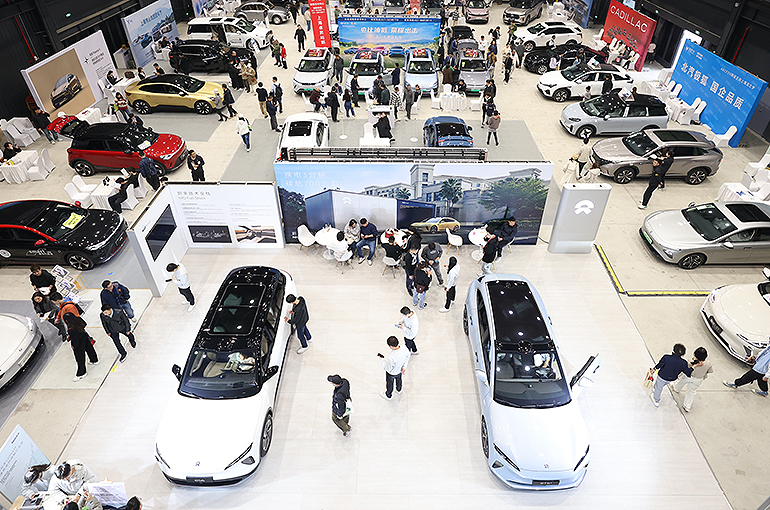 Chinese Auto Dealers Press Carmakers for Better Terms as Inventory Piles Up
Chinese Auto Dealers Press Carmakers for Better Terms as Inventory Piles Up(Yicai) July 2 -- Auto dealer associations in four different Chinese provincial-level regions, including Shanghai and eastern Zhejiang province, are urging car manufacturers to offer more supportive terms as dealers struggle with mounting inventory levels that have exceeded warning thresholds despite an uptick in sales in the first half.
Dealerships in the economically strong Yangtze River Delta are struggling with excessive inventory, chaotic competition and growing financial risks, according to a survey recently conducted by the Shanghai Automobile Sales Trade Association, the Automobile Dealers Chamber of Commerce of the Jiangsu Federation of Industry and Commerce, the Zhejiang Automobile Association and the Anhui Automobile Dealers Chamber of Commerce on the business conditions of auto dealers in their jurisdictions.
A large number of dealerships have gone past the safe inventory threshold, the survey found. For domestic Chinese marques, dealerships are holding over two-months’ worth of stock, while for luxury brands they are holding more than one month and three weeks’ worth and for joint venture brands, they have over one-and-a-half-month’s worth.
Despite strong passenger car sales in June, with sales expected to reach nearly two million units, the inventory pressure has not eased.
The June Inventory Warning Index climbed 3.9 points from May to 56.6 percent, according to the China Automobile Dealers Association. That puts it above the benchmark level, meaning the overall business climate for car dealers is getting worse.
Intense competition and a serious imbalance between supply and demand are making it hard for dealerships to clear inventory, industry insiders told Yicai. Price wars mean dealers are often buying cars at high prices and selling them at low prices, which eats into profits. On top of that, sales targets set by manufacturers are too high, rebate programs are overly complicated and long payment cycles are putting more pressure on dealerships’ cash flow.
Some ordinary equipment manufacturers are forcing dealers to follow their pricing policies, requiring them to sell new cars at prices below cost, the associations said. They argue that this practice may violate China’s Anti-Unfair Competition Law.
It has also become harder for buyers to get car loans. Because of past violations in auto loan practices, many banks in the Yangtze River Delta stopped issuing car loans starting in June. This led to many orders being cancelled and serious sales losses. Consumer confidence has dropped, foot traffic in showrooms has plunged and sales conversion rates are down by over 30 percent, the report said.
In response, the associations are calling on carmakers to let dealers decide their own maximum inventory levels, simplify rebate structures, shorten the payment cycle to within 30 days, set up an early price warning system, ban unfair underpricing and provide special subsidies for cars that are priced too high.
“Inventory went up in June because it’s a crucial month for meeting mid-year sales goals,” said Lang Xuehong, deputy secretary-general of the CADA. “Dealers were trying to hit rebate targets, so they restocked heavily and offered more promotions, but that ended up hurting their June performance. Prices are still on a downward trend, but not a sharp one," he added.
There is likely to be a dip in demand this month due to three main factors, namely pent-up demand from earlier months, bad weather in some areas and the usual summer lull in consumer spending, the CADA said in a previous report. However, the wholesales volume of manufacturers is still increasing, which is adding more inventory pressure. Although new product launches and local car shows might give sales a boost, the overall July market is expected to shrink slightly from June.
Dealers should make realistic sales projections based on actual demand and also step up the promotion of vehicle trade-in and scrappage schemes, the CADA said. The goal should be to boost consumer confidence through better services, while focusing on cutting costs and improving efficiency to reduce financial risks.
Editor: Kim Taylor